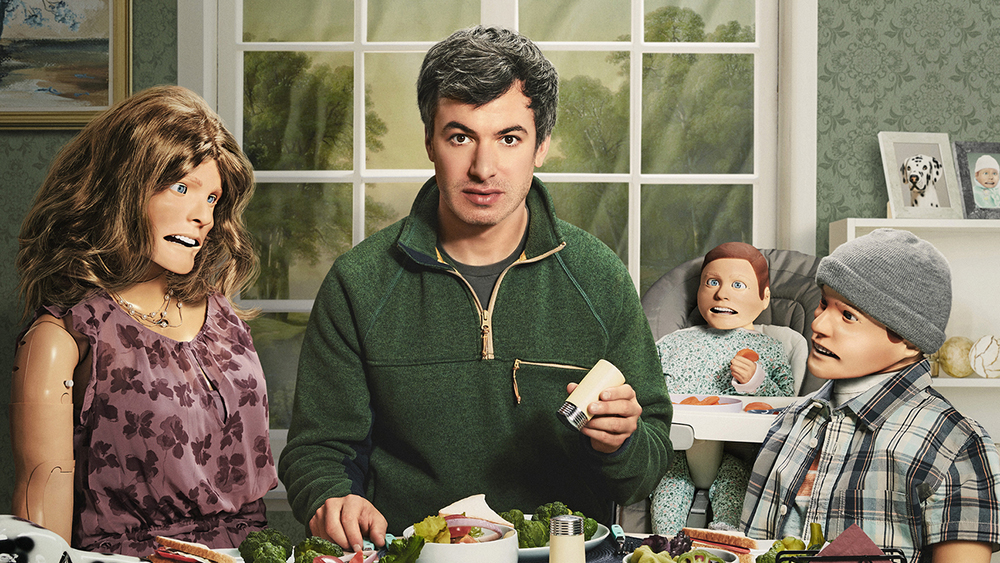Nathan Fielder’s first show felt — in the manner of life — as if it could go anywhere. On his Comedy Central series “Nathan for You,” which aired from 2013 to 2017, Fielder, playing a version of himself in real-world settings, pitched small business owners on ludicrous plots to gin up money and attention, with an endlessly ascendant imagination belying his grave, awkward manner. Now, Fielder returns with “The Rehearsal,” an HBO series that will leave many viewers perplexed as to what happens next, moment to moment and for Fielder more generally. The closest comparison might be “Synecdoche, New York,” the 2008 Charlie Kaufman film that, like “The Rehearsal,” treats life as a performance that can be perfected. And, like Kaufman’s film, “The Rehearsal” has an anarchic heart throbbing beneath a rigorous exterior — meaning that even the viewer who feels the project losing its way can admire Fielder’s abilities to establish lines for himself, and then to scribble outside them.
Getting oneself to admiration, though, will take patience. In the first episode, Fielder introduces a new scheme, working with real-life individuals to practice moments before they happen, so they can guarantee a smooth outcome. Fielder does so with photorealistic accuracy, building a replica of a Brooklyn bar in which one trivia-team member is to admit an embarrassing fib to another. The fantasy — like that of Philip Seymour Hoffman’s character in “Synecdoche, New York,” who creates a theatrical work containing all the elements of his own life — goes beyond laudable: The first episode, which runs a less-than-fleet 44 minutes, presents process as its own reward. Later episodes follow (with digressions) a story about Fielder trying to help a woman of hazy and devout religious beliefs prepare to raise a child, which she aspires to do someday. His staging a life for her and a series of actors playing her future “son” allows Fielder to educate us on child-labor laws governing actors on sets, to demonstrate a sharp eye as he depicts the passage of time, and to paint a portrait of a woman who spends enough time in front of Fielder’s lens to come across as delusional.
No one would mistake this show, or “Nathan for You,” as altruism: They’re meant to entertain us, not improve lives or businesses. (That’s the joke, or one of them.) But in between the two series in which he plays lead, Fielder has served as executive producer on “How To With John Wilson,” a superlative Rube Goldberg series that shifts its narrative direction even more than “The Rehearsal,” and is far more open to people beyond its lead. As writer and director, Fielder is more explicitly conscious than ever of how the Fielder character, an ambitious obsessive with tunnel vision, is isolated from the people he wants to help, and returns to that isolation as a joke with diminishing returns. Fielder built an apparatus to keep himself at a remove: a show that treats only its star as real.
To wit: A recent New York magazine profile of Fielder featured various “Nathan for You” subjects describing their feelings of having been belittled or mocked. This dynamic wasn’t invisible on that show, but it was part of a series that was making larger points about the contortions into which the American economy forces us all — and those seemed worth raising. “The Rehearsal” lacks that clarifying contempt, and settles for generalized bad vibes. It is openly derisive of the people Fielder meets, primarily the woman cast as “mother,” who seems to have been chosen in part because her beliefs — for instance, her sense of Halloween as a satanic ritual — make her a genuine oddball against whom points can be scored easily. Elsewhere, Fielder features one of “The Rehearsal’s” first-episode trivia competitors in a mocking montage, contriving a fake interview that she whiffs by talking too much. (In voiceover, Fielder tells us that his subject’s conversation partner “had a hard time getting a single word in.” We know; we saw.) Her friend, as focused on his trivia night as Nathan is on his project, feels Fielder has done him harm in inadvertently leading him to cheat in a game based on honor. “You’ve ruined the whole thing for me,” this unfortunate fellow tells Fielder. “And I’m on TV now, and everybody now […] is going to think I’m a fake.”
But, in fact, it’s an actor Fielder has hired to play our subject, in yet another “rehearsal,” who’s calling Fielder “an awful, awful person” to conclude the first episode. It’s a sign that Fielder is operating with great self-awareness — that the process through which he leads his quarry is, ultimately, a journey to heal himself, or “himself.” But whether Fielder is awful or just cleverly focused on delivering a watchable story (and whether he’s more Fielder or “Fielder,” man or persona) is less interesting than what his subject might be feeling — a fictionalized version of which Fielder dwells on. All of us are performing, all the time; few are prepared for what it means to be frozen forever on film, locked into another person’s vision, or into a role in a structure one hadn’t been aware existed. “The Rehearsal,” whose creator’s work in the past has taken us unexpected places, now returns, endlessly, to the idea of the creator himself; it’s pulsing with imagination, but ends up with paralyzingly little whimsy.
Correction: An earlier version of this piece misidentified the person who refers to Fielder as “an awful, awful person” in the pilot’s final sequence.
From Variety US



































